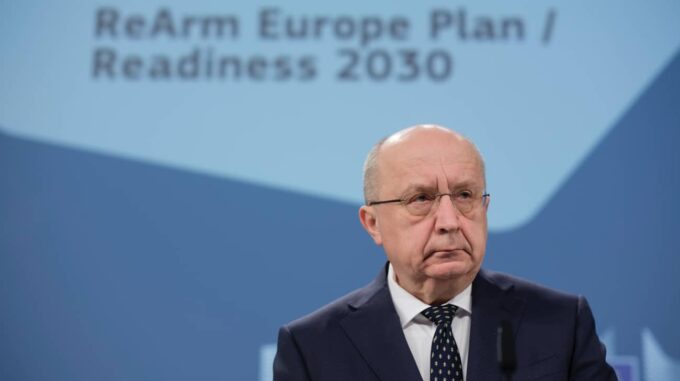CUbilus announced that a portion of the €800 billion allocated under the ReArm Europe plan will be directed towards supporting the Armed Forces of Ukraine

European Commissioner for Defence Andrea CUbilus officially confirmed that the EU’s strategic plan for large-scale funding of its defence needs — ReArm Europe — involves allocating part of the total €800 billion to military assistance to Ukraine. This important announcement was made by the high-ranking official during an interview with the Ukrainian publication "European Pravda," where he elaborated on the implementation mechanisms and possibilities for utilizing these substantial financial resources. According to CUbilus, the main idea of the program consists of two key components: the first is an increase in defence spending by EU member states, with an additional planned financing of approximately €650 billion, and the second is a mechanism for borrowing around €150 billion, which should be directed specifically towards military procurement and modernization of defence capacities. The possibility of using loans is particularly significant. CUbilus emphasized: "Loans within this instrument can only be taken by EU member states. However, they have the right to use these funds for joint purchases with Ukraine, including via Ukrainian defense industry enterprises, and to use them to meet the needs of the Ukrainian Armed Forces." This approach, he explained, opens new opportunities for strengthening Ukraine’s military potential through the integration of European resources. CUbilus also highlighted that Ukraine’s defense industry is for the first time gaining equal opportunities and status alongside other European enterprises. In the European politician’s view, this opens the path for closer cooperation and expansion of Ukrainian capabilities in the military sphere under the umbrella of joint financial and manufacturing efforts. "And of the €650 billion planned to be spent on national defence programs of member states, a part of these funds may also be directed to weapons procurement for Ukraine — ultimately decided by the EU member states," he clarified. The background of this large financial package is quite significant. During the extraordinary EU leaders’ summit on March 6, all EU member states unanimously supported the concept of ReArm Europe. Even highly skeptical politicians, such as Hungarian Prime Minister Viktor Orbán, voiced no objections to this initiative. This demonstrates a high degree of political unity regarding the need to strengthen the EU’s defence capabilities and to activate military cooperation. Previously, CUbilus openly discussed the main priorities of the EU’s defence policy in the near future. These include strategic investment in their own defence potential, reducing dependence on external actors such as the USA, and the need to create self-sufficient European security systems. This will enable Europe not only to defend its borders but also to effectively support Ukraine in resisting Russian aggression. Analysts believe that this extensive funding package could serve as a catalyst for significant changes in cooperation between the EU and Ukraine in the military sphere. Spending by European countries on improving their armies and purchasing new weaponry, also aimed at supporting Ukrainian defence forces, is one of the key directions of implementing this ambitious strategy. In particular, the opportunities for procurement of military equipment and weapons from domestic Ukrainian enterprises — Ukrainian defence industry — open new horizons for collaboration and the development of the defence industry on both sides. In summary, it is worth noting that the decision to reallocate part of the financial resources within the ReArm Europe plan to support Ukraine is an important step not only for strengthening the Ukrainian Armed Forces but also for enhancing the overall defence potential of the European Union. It demonstrates that in times of challenges and geopolitical tensions, European leaders are prepared to act with a united voice, supporting Ukraine’s aspirations for independence and security in our volatile world.

